
Find Help
More Items From Ergsy search
-

What treatments are available for eczema?
Relevance: 100%
-
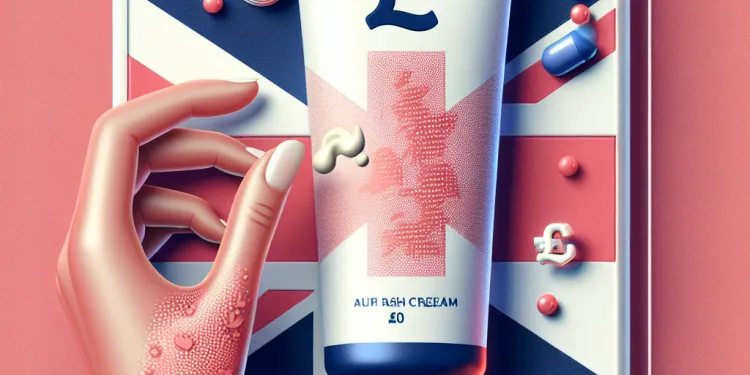
Is there a cure for eczema?
Relevance: 85%
-

Is eczema contagious?
Relevance: 82%
-

What is eczema? General Information
Relevance: 78%
-

What causes eczema?
Relevance: 78%
-

What are the main types of eczema?
Relevance: 77%
-
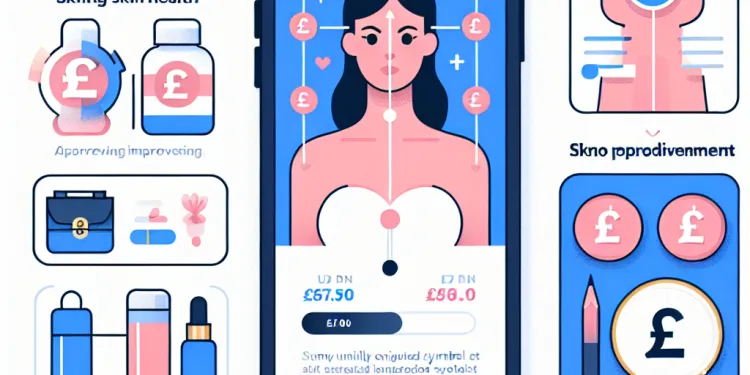
Can eczema improve with age?
Relevance: 77%
-

Are there any home remedies for eczema?
Relevance: 75%
-

How can eczema be diagnosed?
Relevance: 74%
-

Eczema - Your child's appointment | Dermatology | Paediatrics
Relevance: 73%
-

Managing and treating your child's eczema
Relevance: 73%
-

Can diet affect eczema?
Relevance: 73%
-

Who is at risk of developing eczema?
Relevance: 71%
-

Factors that trigger eczema in your child
Relevance: 71%
-

How can I prevent eczema flare-ups?
Relevance: 70%
-

Can dust mites cause asthma and eczema?
Relevance: 65%
-

What are common symptoms of eczema?
Relevance: 54%
-

How does weather affect eczema?
Relevance: 49%
-

Can anyone get Botox treatments?
Relevance: 37%
-
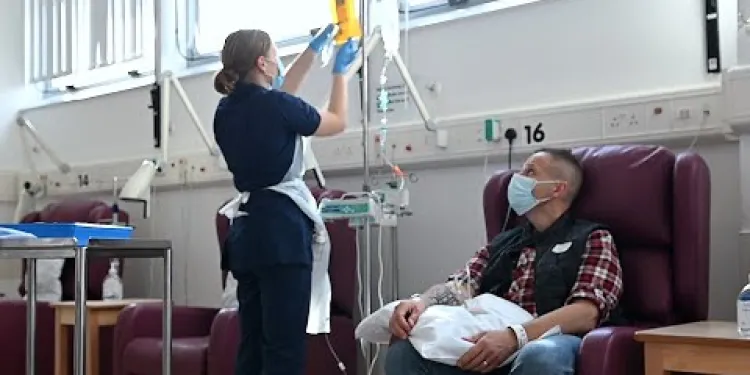
Having chemotherapy and other treatments in the Day Treatment Unit
Relevance: 33%
-
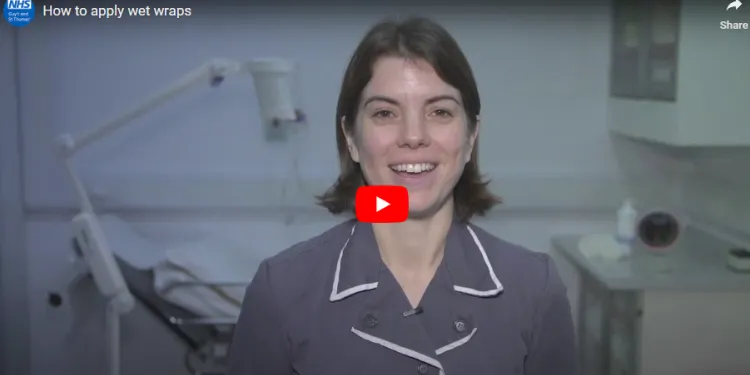
How to apply wet wraps
Relevance: 32%
-

Is there a treatment for measles?
Relevance: 32%
-

Is there a treatment for measles?
Relevance: 32%
-

Are chiropractic treatments safe?
Relevance: 31%
-

Is Botox treatment expensive?
Relevance: 31%
-

Are chiropractic treatments painful?
Relevance: 31%
-

What is the treatment for appendicitis?
Relevance: 31%
-

Eating disorders: treatment
Relevance: 31%
-

Is Paillon treatment a form of chemotherapy?
Relevance: 30%
-

What is Paillon treatment for cancer?
Relevance: 30%
-

Who developed the Paillon treatment?
Relevance: 30%
-

How is Paillon treatment administered?
Relevance: 30%
-

BSL - Treatments for insomnia
Relevance: 30%
-

Is Paillon treatment FDA approved?
Relevance: 30%
-

Is a prescription required for Paillon treatment?
Relevance: 30%
-
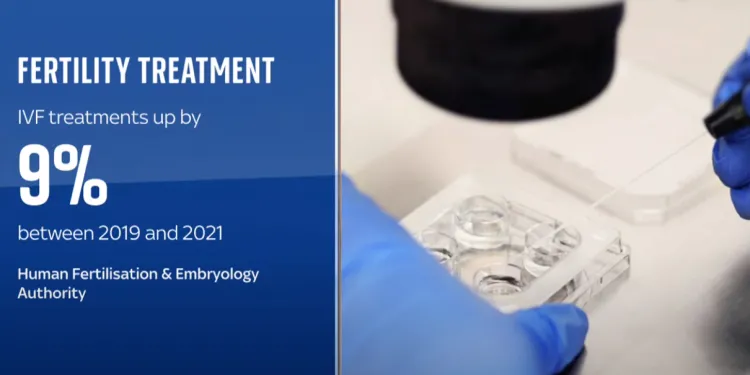
Fertility treatments on the up, but not via the NHS
Relevance: 30%
-

What are topical treatments for psoriasis?
Relevance: 30%
-
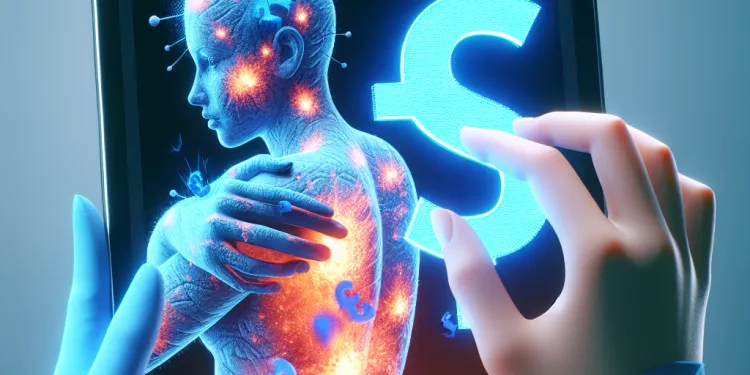
Can stress make eczema worse?
Relevance: 30%
-

What is the treatment for chickenpox?
Relevance: 29%
-

Are homeopathic treatments covered by the NHS?
Relevance: 29%
Understanding Eczema Treatment Options
Eczema, also known as atopic dermatitis, is a chronic skin condition that causes inflammation, redness, and irritation. While there is no known cure, several treatments aim to manage symptoms and prevent flare-ups. If you're living in the UK and dealing with eczema, understanding your treatment options is crucial for managing the condition effectively.
Topical Treatments
Topical treatments include creams, ointments, and lotions applied directly to the skin. The most common topical treatment for eczema is corticosteroid creams. These help reduce inflammation and relieve itching. They come in various strengths, so it's important to use the one prescribed by your GP. Non-steroid topical treatments, such as calcineurin inhibitors (e.g., tacrolimus and pimecrolimus), are alternatives that can be used, particularly for sensitive areas like the face.
Moisturising Emollients
Emollients are moisturising treatments applied regularly to keep the skin moist and reduce itchiness and scaling. They are a fundamental part of eczema management, helping to repair the skin barrier and prevent dermatitis flare-ups. Emollients can range from lotions to creams and ointments, with the latter being more greasy yet effective for very dry skin. It's recommended to apply emollients generously and frequently.
Antihistamines
For individuals with severe itching that disrupts sleep, antihistamines may be recommended. These are taken orally and can provide relief from itching. However, they often cause drowsiness, so they're most commonly prescribed for nighttime use.
Wet Wrap Therapy
Wet wrap therapy involves wrapping the affected area with damp bandages over emollients or topical steroids. This method can be particularly soothing and helps rehydrate and calm irritated skin. It's more commonly used for severe eczema not responding to standard treatments. Consult with a healthcare professional to learn the proper technique before trying this therapy at home.
Phototherapy
Phototherapy, or light therapy, involves exposing the skin to controlled amounts of ultraviolet (UV) light. It's typically considered for people with moderate to severe eczema that hasn't improved with topical treatments. Treatment is usually administered by a dermatologist in a hospital setting over several weeks.
Systemic Treatments
In cases of severe and widespread eczema that doesn't respond to other treatments, systemic medications might be prescribed. These include oral corticosteroids, immunosuppressants like cyclosporine, and newer biological therapies such as dupilumab. These treatments require close medical supervision due to potential side effects.
Self-Care and Lifestyle Tips
Alongside medical treatments, managing eczema often involves lifestyle adjustments. Regularly using moisturisers, avoiding known triggers, wearing cotton clothing, and maintaining a consistent skincare routine are essential strategies. Stress management can also play a role, as stress is a known eczema trigger. Consult with healthcare professionals for tailored advice on managing your eczema effectively.
Understanding Eczema Treatment Options
Eczema is also called atopic dermatitis. It is a long-term skin problem that causes your skin to be red, sore, and itchy. There is no known cure for eczema, but there are ways to help with the symptoms and stop it from getting worse. If you live in the UK and have eczema, it is important to know your treatment options to manage it well.
Topical Treatments
Topical treatments are creams, ointments, and lotions that you put directly on your skin. The most common treatment is corticosteroid creams. These creams help reduce swelling and make the itching less. They come in different strengths, so you should use the one your doctor gives you. There are other creams like calcineurin inhibitors (like tacrolimus and pimecrolimus) that can be used, especially on sensitive skin areas like your face.
Moisturising Emollients
Emollients are creams and lotions that make your skin moist. They help to stop your skin from itching and peeling. Using emollients is very important for managing eczema. They help repair your skin and stop flare-ups. Emollients can be lotions, creams, or ointments. Ointments are more oily but good for very dry skin. You should use them often and in large amounts.
Antihistamines
If itching is very bad and stops you from sleeping, you might take antihistamines. These are pills that can help stop the itching. They can make you sleepy, so they are usually taken at night.
Wet Wrap Therapy
Wet wrap therapy means you wrap damp bandages over emollients or steroid creams on your skin. This can make your skin feel better and help it heal. It is usually used for very bad eczema that doesn't get better with other treatments. You should talk to a healthcare person to learn how to do this safely at home.
Phototherapy
Phototherapy, or light therapy, means showing your skin to a small amount of special light. This is mainly for people with bad eczema that hasn't gotten better with creams. A dermatologist usually does this treatment in a hospital for several weeks.
Systemic Treatments
If eczema is very bad and all over, and other treatments do not work, you might need medicine by mouth. These medicines include corticosteroids, immunosuppressants like cyclosporine, and new therapies like dupilumab. A doctor needs to watch you closely while you are on these medicines because they can have side effects.
Self-Care and Lifestyle Tips
Besides medical treatments, taking care of yourself is also important. Use moisturisers often, stay away from things that make your eczema worse, wear cotton clothes, and keep a regular skincare routine. Stress can make eczema worse, so it's good to manage stress too. Talk to healthcare people for advice on managing your eczema better.
Frequently Asked Questions
What are the common treatments for eczema?
Common treatments for eczema include moisturizing creams, topical corticosteroids, and oral medications to reduce inflammation and itching.
Are there natural remedies for eczema?
Yes, natural remedies such as coconut oil, oatmeal baths, and aloe vera can help soothe eczema symptoms.
Can antihistamines be used to treat eczema?
Antihistamines can be used to help relieve itching, particularly at night, although they do not treat the underlying inflammation of eczema.
Is phototherapy effective for eczema treatment?
Phototherapy, or light therapy, can be effective for some people with moderate to severe eczema when other treatments haven't worked.
How do topical corticosteroids work for eczema?
Topical corticosteroids reduce inflammation and itching by suppressing the immune response in the affected area.
Can diet changes help in managing eczema?
Some people find that avoiding certain foods that trigger their symptoms can help manage eczema, although more research is needed in this area.
What is the role of moisturizers in eczema treatment?
Moisturizers help to maintain the skin barrier, reducing dryness and irritation which can exacerbate eczema.
Are there prescription treatments for eczema?
Yes, prescription treatments for eczema include stronger topical steroids, calcineurin inhibitors, and biologic drugs for severe cases.
What are calcineurin inhibitors for eczema?
Calcineurin inhibitors are non-steroidal medications that help reduce inflammation by inhibiting certain immune responses, used in sensitive areas or when steroids are not suitable.
Is there a cure for eczema?
There is no cure for eczema, but many treatments are available that control symptoms and manage flare-ups effectively.
Do probiotics help with eczema management?
Some studies suggest that probiotics might help reduce the severity of eczema in children, but more research is needed to confirm their effectiveness in adults.
Can stress management help with eczema?
Stress can trigger or worsen eczema, so stress management techniques like mindfulness and relaxation can be beneficial.
Are immunosuppressants used in eczema treatment?
Immunosuppressants may be prescribed for severe eczema to reduce the immune system's activity and improve symptoms.
How important is skincare in eczema treatment?
Proper skincare, including regular moisturizing and gentle cleansing, is essential in managing eczema and preventing flare-ups.
What lifestyle changes can help with eczema?
Lifestyle changes such as wearing soft clothing, avoiding harsh soaps, and maintaining a healthy diet can help manage eczema.
Can eczema be treated with biologic drugs?
Biologics like dupilumab can be prescribed for moderate to severe eczema when other treatments haven't been successful.
What role do environmental factors play in eczema treatment?
Identifying and avoiding environmental triggers like pollen, dust, and pet dander is important in managing eczema flare-ups.
Are there any new treatments for eczema?
New treatments, including advanced topical medications and biologics, are continually being developed and tested for eczema.
What is the importance of patch testing in eczema management?
Patch testing can help identify allergies that might be triggering eczema, allowing patients to avoid specific allergens.
How often should an eczema sufferer see a dermatologist?
The frequency of visits depends on the severity of eczema, but regular check-ups are recommended to manage the condition effectively.
How is eczema treated?
Eczema is a skin condition that makes your skin itchy and red. Here’s how you can treat it:
- Use Creams and Ointments: Put special creams on your skin to help with itching and redness.
- Take Warm Baths: A warm bath can help your skin feel better. Don’t make it too hot.
- Wear Soft Clothes: Wear clothes made of soft materials like cotton to protect your skin.
- Stay Away from Triggers: Some things can make eczema worse, like certain soaps or foods. Try to find out what bothers your skin and avoid them.
If your skin still hurts, talk to a doctor or a nurse. They can give you more help.
When you have eczema, there are some ways to feel better. You can use special creams to make your skin soft. Doctors might give you medicine to put on your skin if it is very itchy or red. Sometimes, you might need to take a medicine to help calm your skin inside your body.
Can nature help with itchy skin problems?
Do you have itchy skin? You might call it eczema. There are some natural ways to help.
Here are some things you can try:
- Oatmeal baths: Put some oatmeal in warm bath water. It can feel good on your skin.
- Coconut oil: Rub this oil on your skin. It can make your skin feel soft.
- Aloe vera: Use a plant or gel. It helps cool your skin.
Remember to talk to a doctor if your skin is very sore or itchy. They can help.
Tools that can help:
- Picture cards: Use pictures to help you understand.
- Audio books: Listen to stories if reading is hard.
Yes, there are natural ways to help with eczema. You can use things like coconut oil, oatmeal baths, and aloe vera to make it feel better.
Can antihistamines help with eczema?
Antihistamines can help with itching, especially at night. But they do not fix the problem that causes eczema.
Does light therapy help with eczema?
Light therapy can help if you have bad eczema and other treatments don't work. This means using special lights to make your skin feel better.
How do creams for eczema work?
Eczema is a skin problem that makes your skin itchy and red.
Corticosteroid creams help make the skin less itchy and red.
These creams lower the swelling and help the skin get better.
Ask your doctor or pharmacist how to use these creams.
Helpful tools:
- Use a daily schedule to remind you when to put on the cream.
- Use pictures to show where to put the cream.
Topical corticosteroids are a kind of medicine. They help to stop swelling and itching on your skin. They do this by calming down the body’s defense system in the sore area.
Can changing what you eat help with eczema?
Eczema makes your skin red and itchy. Sometimes, changing the food you eat can help. Here are some ideas:
- Try to eat healthy foods like fruits and vegetables.
- Drink lots of water every day.
- Some foods might make eczema worse, like milk, eggs, or nuts. Pay attention to any foods that seem to cause trouble for you.
- If you're not sure what foods to eat, ask a grown-up or a doctor for help.
Here are some tips to help:
- Keep a food diary. Write down what you eat and if your skin gets itchy.
- Use pictures or stickers to track foods in your diary.
- Read storybooks about healthy eating.
- Watch videos made for children about foods and eczema.
Some foods can make eczema worse. Staying away from these foods might help. We need more studies to know for sure.
How do creams help with eczema?
Creams can make your skin soft and stop it from getting too dry. When you have eczema, creams can help your skin feel better.
- Keep skin soft: Creams add water to your skin.
- Stop itching: Using cream can help your skin not feel itchy.
- Protect skin: Creams make a barrier to protect skin from things that hurt it.
For extra help, remember these tips:
- Use cream every day.
- Put it on after a bath or shower.
- Ask an adult if you need help.
Moisturizers keep your skin soft and healthy. They stop your skin from getting too dry or itchy. This can help if you have eczema.
Can a doctor give medicine for eczema?
Yes, doctors can give stronger medicine to help with eczema. This includes special creams and stronger drugs for really bad eczema.
What Are Calcineurin Inhibitors for Eczema?
Calcineurin inhibitors are medicines. They help treat eczema. Eczema makes your skin itchy and red.
These medicines help stop the itching. They make the swelling go down.
If you have eczema, talk to a doctor. They can help you choose the right medicine.
Tools to help you:
- Ask a family member or friend to read with you.
- Use pictures to help understand.
- Write down questions to ask your doctor.
Calcineurin inhibitors are medicines that help reduce swelling and redness. They work by stopping some actions of the body's defense system. Doctors use them in delicate areas or when other medicines like steroids can't be used.
Can eczema be cured?
Eczema is a skin problem that makes your skin itchy and red. There is no cure yet, but there are ways to feel better.
Here are some things you can try:
- Use creams to make your skin feel better.
- Ask a doctor for medicine to help your skin.
- Try to not scratch your skin.
- Wear soft clothes that don't hurt your skin.
- Stay away from things that make your skin worse, like some soaps or certain foods.
Talk to a doctor or nurse if you need help with eczema.
We cannot make eczema go away forever, but there are many ways to help take care of it. These ways can help stop the itching and make the skin feel better.
Do probiotics help with eczema management?
Probiotics are tiny good germs that live in your tummy. Some people think they might help with eczema. Eczema is when your skin gets itchy and red.
It’s important to talk to your doctor if you think probiotics might help you. They can tell you what’s best for you.
Reading tools like audiobooks or reading apps can also help understand this better!
Some research shows that probiotics might help make eczema less bad in children. But we need more studies to know if they work for adults.
Can feeling calm help with itchy skin?
If you feel itchy and have red skin, it might be eczema.
Feeling worried or upset, called stress, can make eczema worse.
Here are some ways to feel calm:
- Take deep breaths
- Listen to music you like
- Talk to someone who makes you happy
- Color or draw for fun
- Try soft yoga or stretching
If you feel calm, your skin might feel better too!
Stress can make eczema worse. Doing things to help you relax, like mindfulness and calm breathing, can help.
Do medicines that lower the immune system help with eczema?
Doctors might give you medicine called immunosuppressants if your eczema is very bad. It helps calm down your body's defenses and makes you feel better.
How important is skincare when taking care of eczema?
Taking care of your skin is very important if you have eczema. You can help your skin by putting on lotion often and washing it gently. This can stop your skin from getting itchy or sore.
How can changes in your daily life help with eczema?
To help with eczema, you can try some simple changes. Wear soft clothes that feel nice on your skin. Use gentle soaps that are not too strong. Eating healthy food is also a good idea.
Can we use special medicine to help eczema?
Doctors can give a medicine called dupilumab. It is a special medicine for bad eczema when other medicines do not help.
How do things around us affect eczema?
To help with eczema, try to stay away from things like pollen, dust, and pet hair. These can make your skin itchy and sore.
Are there new ways to help with eczema?
There are new treatments for eczema. This means they are making new creams and medicines to help. These medicines are being tested to see if they work.
Why is patch testing important for managing eczema?
Patch testing helps find out what might be making your skin itchy and red. It is important because it shows you what things you should stay away from to keep your skin healthy.
You can try using pictures or videos to understand the test better. Ask a grown-up to help you if you have questions.
Patch testing is a way to find out what things make your skin itch. It helps doctors see what causes your eczema, so you can stay away from those things.
How often should someone with eczema visit a skin doctor?
If you have eczema, it’s good to see a skin doctor. A skin doctor is also called a dermatologist.
Here’s a simple guide:
- If your eczema is new or getting worse, see the skin doctor as soon as you can.
- If your eczema is not too bad, visit the skin doctor every 6 to 12 months.
- If you are trying new treatments, see the skin doctor for regular check-ups.
Helpful tips:
- Write down your questions before your visit.
- Take a friend or family member with you to help remember what the doctor says.
- Use picture charts or apps to track your symptoms and treatment.
How often you visit the doctor depends on how bad your eczema is. But it is a good idea to see the doctor often to keep eczema under control.
Useful Links
This website offers general information and is not a substitute for professional advice.
Always seek guidance from qualified professionals.
If you have any medical concerns or need urgent help, contact a healthcare professional or emergency services immediately.
Some of this content was generated with AI assistance. We’ve done our best to keep it accurate, helpful, and human-friendly.
- Ergsy carfully checks the information in the videos we provide here.
- Videos shown by Youtube after a video has completed, have NOT been reviewed by ERGSY.
- To view, click the arrow in centre of video.
- Most of the videos you find here will have subtitles and/or closed captions available.
- You may need to turn these on, and choose your preferred language.
- Go to the video you'd like to watch.
- If closed captions (CC) are available, settings will be visible on the bottom right of the video player.
- To turn on Captions, click settings .
- To turn off Captions, click settings again.
More Items From Ergsy search
-

What treatments are available for eczema?
Relevance: 100%
-

Is there a cure for eczema?
Relevance: 85%
-

Is eczema contagious?
Relevance: 82%
-

What is eczema? General Information
Relevance: 78%
-

What causes eczema?
Relevance: 78%
-

What are the main types of eczema?
Relevance: 77%
-

Can eczema improve with age?
Relevance: 77%
-

Are there any home remedies for eczema?
Relevance: 75%
-

How can eczema be diagnosed?
Relevance: 74%
-

Eczema - Your child's appointment | Dermatology | Paediatrics
Relevance: 73%
-

Managing and treating your child's eczema
Relevance: 73%
-

Can diet affect eczema?
Relevance: 73%
-

Who is at risk of developing eczema?
Relevance: 71%
-

Factors that trigger eczema in your child
Relevance: 71%
-

How can I prevent eczema flare-ups?
Relevance: 70%
-

Can dust mites cause asthma and eczema?
Relevance: 65%
-

What are common symptoms of eczema?
Relevance: 54%
-

How does weather affect eczema?
Relevance: 49%
-

Can anyone get Botox treatments?
Relevance: 37%
-

Having chemotherapy and other treatments in the Day Treatment Unit
Relevance: 33%
-

How to apply wet wraps
Relevance: 32%
-

Is there a treatment for measles?
Relevance: 32%
-

Is there a treatment for measles?
Relevance: 32%
-

Are chiropractic treatments safe?
Relevance: 31%
-

Is Botox treatment expensive?
Relevance: 31%
-

Are chiropractic treatments painful?
Relevance: 31%
-

What is the treatment for appendicitis?
Relevance: 31%
-

Eating disorders: treatment
Relevance: 31%
-

Is Paillon treatment a form of chemotherapy?
Relevance: 30%
-

What is Paillon treatment for cancer?
Relevance: 30%
-

Who developed the Paillon treatment?
Relevance: 30%
-

How is Paillon treatment administered?
Relevance: 30%
-

BSL - Treatments for insomnia
Relevance: 30%
-

Is Paillon treatment FDA approved?
Relevance: 30%
-

Is a prescription required for Paillon treatment?
Relevance: 30%
-

Fertility treatments on the up, but not via the NHS
Relevance: 30%
-

What are topical treatments for psoriasis?
Relevance: 30%
-

Can stress make eczema worse?
Relevance: 30%
-

What is the treatment for chickenpox?
Relevance: 29%
-

Are homeopathic treatments covered by the NHS?
Relevance: 29%


